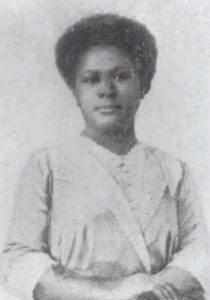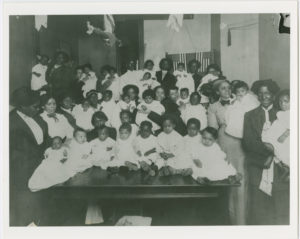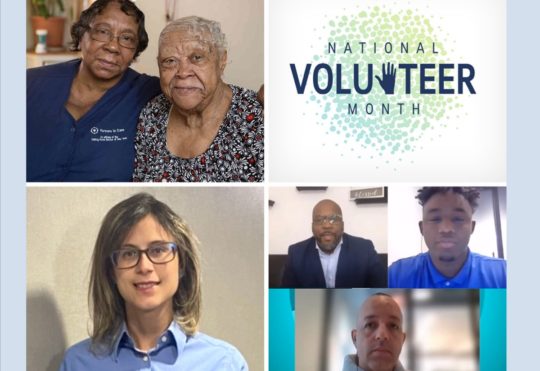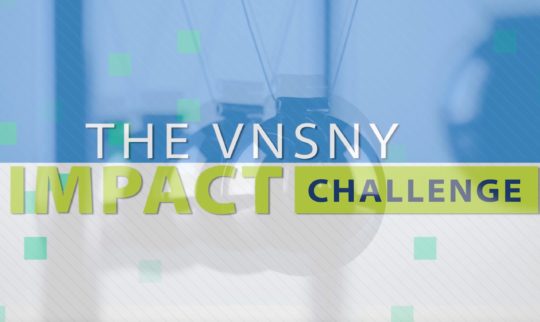Black History Month at VNSNY: Elizabeth Tyler, VNSNY’s First African American Nurse
As part of VNSNY’s recognition of Black History Month, Frontline is featuring profiles of several pioneering African American nurses. Today’s profile spotlights Elizabeth Tyler, pictured below. To read the profile of Edith Carter, VNSNY’s second African American nurse, click here. To read the profile of of Jessie Sleet Scales, the nation’s first African American public health nurse, click here.
 In 1906, Elizabeth Tyler was the very first African American nurse to be hired by VNSNY and the Henry Street Settlement. Elizabeth joined VNSNY after graduating from nursing school and then completing an advanced course in nursing. Despite her extensive training, however, the segregated state of U.S. healthcare at the time meant she was not allowed to treat white patients. So taking a page from the book of VNSNY’s founder, Lillian Wald, Elizabeth headed on her own initiative to the African American neighborhood of San Juan Hill on Manhattan’s West Side, where she began treating the local residents.
In 1906, Elizabeth Tyler was the very first African American nurse to be hired by VNSNY and the Henry Street Settlement. Elizabeth joined VNSNY after graduating from nursing school and then completing an advanced course in nursing. Despite her extensive training, however, the segregated state of U.S. healthcare at the time meant she was not allowed to treat white patients. So taking a page from the book of VNSNY’s founder, Lillian Wald, Elizabeth headed on her own initiative to the African American neighborhood of San Juan Hill on Manhattan’s West Side, where she began treating the local residents.
Tuberculosis and other infectious diseases were widespread at the time and Elizabeth’s skills were badly needed. To gain the trust of the people in the community, Elizabeth befriended the building staff who were responsible for maintaining all the buildings in the neighborhood—knowing that if the staff vouched for her, their tenants would welcome her in.
Not long after that, Elizabeth persuaded Lillian to let her open up a branch of the Henry Street Settlement/VNSNY on West 62nd Street, called the Stillman House Settlement. She founded the branch together with two other African American home care pioneers whose profiles are also being featured in Frontline this month: Jessie Sleet Scales, the very first African American public health nurse in U.S. history, and Edith Carter, the first African American nurse to provide primary maternal and infant care in New York City.
In addition to providing essential home health care to thousands of San Juan Hill residents over the years, these pioneering public health nurses expanded the Stillman House Settlement from its original small storefront location into a central neighborhood hub for social services and activities. Elizabeth, Jessie and Edith also became influential leaders and role models for black nursing professionals across America.

Stillman House Settlement on West 62nd Street
While we hear a lot about VNSNY’s Lower East Side roots, we don’t talk as much about the organization’s equally important presence in Manhattan’s West Side African American community during the early 20th century. It’s a vital part of VNSNY’s history, and a legacy we are proud to celebrate.
Besides supporting these important clinical care functions, VNSNY’s African American nurses were also the first in the country to work at the same salary and benefit levels as their white counterparts, as well as the first black nurses to work with tuberculosis patients. Throughout its existence, VNSNY has been a forceful advocate both for a diverse healthcare workforce and for equal access to home care and other healthcare services for all New Yorkers. That advocacy has also extended to civil rights in general: Lillian Wald herself, being an outspoken champion of women and minorities, was a founding member of the NAACP and even hosted the group’s very first meeting at the Henry Street Settlement!
Today, our organization continues to play an active part in this ongoing history, which in New York now includes home health care workers from all over the globe. Within VNSNY, approximately half our staff are of African ancestry. Meanwhile, in the community, VNSNY is a national leader in addressing health care disparities among black Americans through our home care, hospice and community mental health services, our health plans, and our community benefit programs, as well as through the cutting-edge work of the VNSNY Research Center.
As these examples show, when it comes to home health care in New York, Black History is in some ways VNSNY’s history as well … and we’re proud to be celebrating it together!

